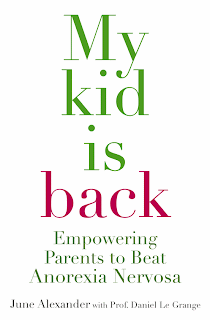Wisdom from Down Under
Today, I had the great fortune of reading two great pieces from Australia on eating disorders.
The first is an article titled Anorexia's Lifelong Legacy from the Sydney Morning-Herald, about how eating disorder diagnoses are missed in many boys, simply because pediatricians aren't looking for them, and don't think that males get eating disorders. Because proper, quick diagnosis has a large impact on disease outcome, these kinds of stories are very important. Besides covering this timely and important topic, the article did so in a scientifically accurate way. Some of my favorite quotes:
"When kids are starved, their brains shrink, they're more likely to get depressed and anxious, their thinking slows down and memory falters," Madden says. "This affects their relationships with their friends. The effects can be reversed with re-feeding, but not always."
These serious complications can be prevented if children at risk are picked up early. "If children get the right treatment early, 70 to 80 per cent get well in 12 months and 90 per cent are better in five years. This is much better than in adults where the recovery rate at five years is less than 50 per cent," Madden says.
And
Whether an eating disorder can take hold and thrive seems to rest in the balance of risk and protective factors that a person experiences. In the last few decades, the increasing number of risk factors experienced by children - such as stress, anxiety, dieting, body image worries, and exposure to media images and messages that equate fat loss with happiness - may be creating an unhealthy tipping point.
And
The media comes under fire, not as the cause of eating disorders, but as a potent "enabler" of fat phobia, body discontent and restrictive eating in young people...Kohn agrees that children are being influenced by anti-obesity messages. "Vulnerable children hear them in the wrong way and take them to the extreme. Then a physiological mechanism kicks in, reinforcing the behaviour. Eating less and losing weight dampens down the serotonergic mechanism in our brain that processes emotional responses. This makes the children feel better, calmer, less reactive. Their behaviour improves and they get positive feedback, locking in the dieting behaviour."
I wish more articles on anorexia were like this, chock-full of the latest research and entirely lacking in sensationalism and parent- and sufferer-blaming. The other good read from Down Under is the book "My Kid is Back: Empowering Parents to Beat Anorexia Nervosa" by June Alexander. The book arrived in the mail on Monday, and I've been steadily chipping away at it ever since. As the title suggests, it is more intended for parents than sufferers, and contains the stories of several families who have helped their children conquer their eating disorder. Filled with wisdom and hope, it will be a great read for people needing encouragement along this long journey of recovery. It officially arrives for sale in the US in September, and you can pre-order your copy from Amazon.
The other good read from Down Under is the book "My Kid is Back: Empowering Parents to Beat Anorexia Nervosa" by June Alexander. The book arrived in the mail on Monday, and I've been steadily chipping away at it ever since. As the title suggests, it is more intended for parents than sufferers, and contains the stories of several families who have helped their children conquer their eating disorder. Filled with wisdom and hope, it will be a great read for people needing encouragement along this long journey of recovery. It officially arrives for sale in the US in September, and you can pre-order your copy from Amazon.
Enjoy your Down Under reads- I know I am! Now, about that duck-billed platypus...






3 comments:
Next stop is Amazon.com. Thanks!
I am curious as to why the recovery rate is not as good in adults as children. Do you have any insights? Is it just that the disordered behavior has become more ingrained?
Anon,
I'm guessing that since average onset is around 14-16 years, adults have been sicker longer. I think another point is that parents can legally keep their teens in treatment for ED but they don't have that power in adults.
Sad Mom,
I hope you enjoy the book- I thought of you when I was reading it.
Post a Comment